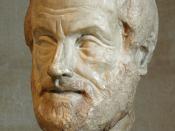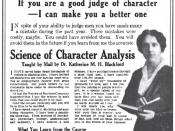For one to develop moral character, one must rely on the praise and blame of other individuals and use this feedback to reflect on their own actions. We praise those with a virtuous character while we blame characters without such virtues. Aristotle examines the moral evaluation process by introducing identifiers that distinguish that which we can truly hold other persons responsible for. First, Aristotle finds the source for which praise and blame can be used. Action is the point at which virtues are reflected, and actions only of which one can be held responsible for give grounds for the praise and blame that is given. It is not justifiable to place blame on those who cannot be held responsible for their actions, and there is a limited scope of such types of actions. Through the praise and blame that is given properly, one can use this feedback to monitor moral character, and this process of evaluation is what brings about the moral education that human beings receive throughout their lifetime.
Aristotle articulates the boundaries of actions by first separating all that is involuntary from the sphere of the voluntary actions, since no person can be held responsible for involuntary action. The voluntary actions that are spoken of require some amount of control; causal control is the term referring to actions which are internally caused, while control through knowledge is also needed to know the disposition of the possible action as well as the repercussions. When the agent has these kinds of control, and chooses to act upon them in light of this knowledge, the agent can be held responsible for the action.
In turn, Aristotle limits the scope of the involuntary actions to actions which lack either causal control or knowledge control. If one lacks causal control, they...


